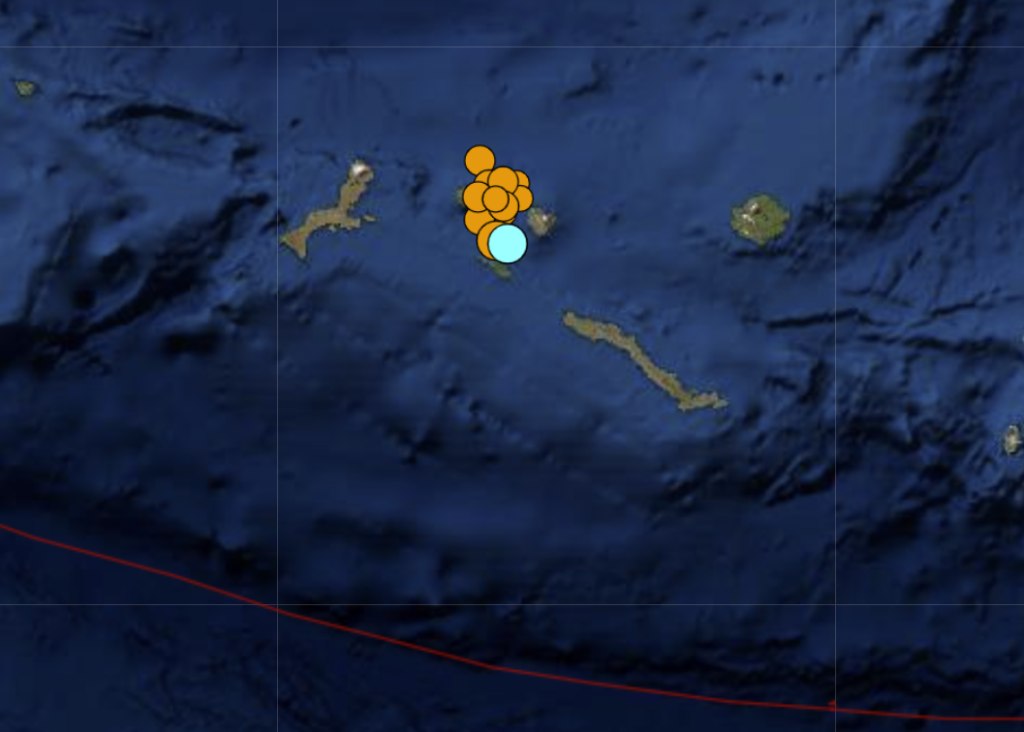
The Rat Islands are part of the Aleutian Islands, a chain of volcanic islands, that results from the subduction of the Pacific Plate beneath the North American Plate.
This plate boundary, the Alaska-Aleutian megathrust, has been the location of many megathrust earthquakes. The latest occurred in on February 4, 1965.
Today, more than 15 earthquakes have rattled the same area.
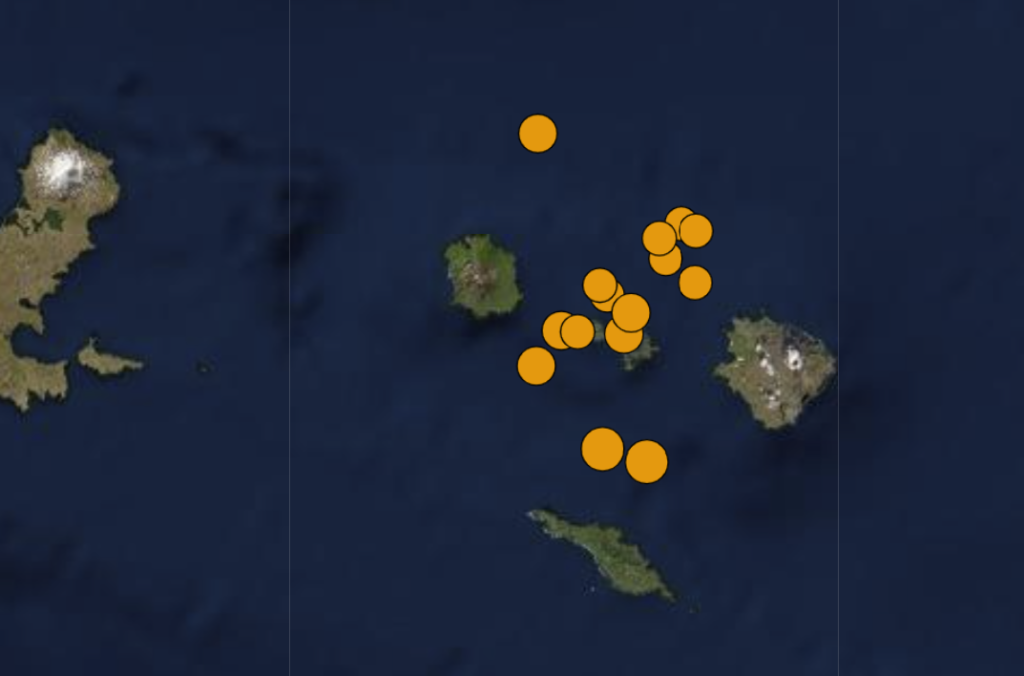
As shown in the list of earthquake below, the strongest quake was a M4.5.
M 3.7 – Rat Islands, Aleutian Islands, Alaska
M 3.5 – Rat Islands, Aleutian Islands, Alaska
M 2.6 – Rat Islands, Aleutian Islands, Alaska
M 2.5 – Rat Islands, Aleutian Islands, Alaska
M 4.2 – Rat Islands, Aleutian Islands, Alaska
M 2.5 – Rat Islands, Aleutian Islands, Alaska
M 2.8 – Rat Islands, Aleutian Islands, Alaska
M 3.3 – Rat Islands, Aleutian Islands, Alaska
M 3.6 – Rat Islands, Aleutian Islands, Alaska
M 4.5 – Rat Islands, Aleutian Islands, Alaska
M 2.9 – Rat Islands, Aleutian Islands, Alaska
M 2.8 – Rat Islands, Aleutian Islands, Alaska
M 2.5 – Rat Islands, Aleutian Islands, Alaska
M 3.4 – Rat Islands, Aleutian Islands, Alaska
M 3.0 – Rat Islands, Aleutian Islands, Alaska
The swarm of earthquakes is occurring near the Davidof volcano. This swarm may be associated with volcanic unrest or it could also be due to regional tectonic activity.
I am now wondering if this seismic series could be the sign of a new major earthquake along the Alaska-Aleutian megathrust… Or is a new volcano about to erupt?
Davidof Volcano waking up?
Due to the possibility of escalating volcanic unrest, AVO raised the Aviation Color Code and Volcano Alert Level for Davidof to YELLOW/ADVISORY.
AVO continues to monitor the situation with seismometers deployed on nearby islands since there is no real-time seismic monitoring network at Davidof volcano. The closest seismometers to Davidof are approximately 13 km (8 miles) to the east of the volcano on Little Sitkin Island.
Davidof volcano is a mostly submerged stratovolcano in the Rat Islands group in the western Aleutian Islands, about 350 km (218 miles) west of Adak.
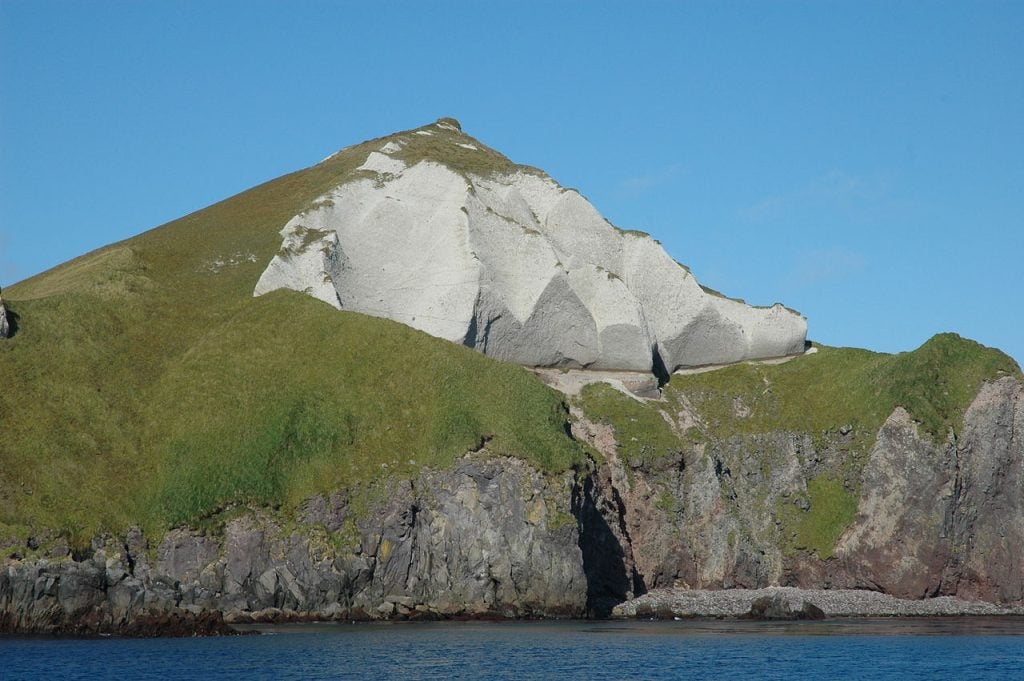
The subaerial part of the volcano comprises Davidof, Khvostof, Pyramid, and Lopy islands, which encircle Crater Bay, a 2.5 km (1.5 mile) diameter caldera. The islands are built up from interbedded lava flows and explosive deposits.
The volcano has been sparsely studied, but visits by Alaska Volcano Observatory geologists in 2021 documented thick sequences of rhyolite to dacite pyroclastic flow and fall deposits that represent the most recent explosive eruptions.
The age of these deposits is unknown, but they appear older than Holocene deposits from nearby Segula and Little Sitkin. There are no known historical eruptions from Davidof.
The 1965 Rat Islands earthquake
The 1965 Rat Islands earthquake share common features with the 1963 Kuril Islands earthquake and the 1964 Alaska earthquake.
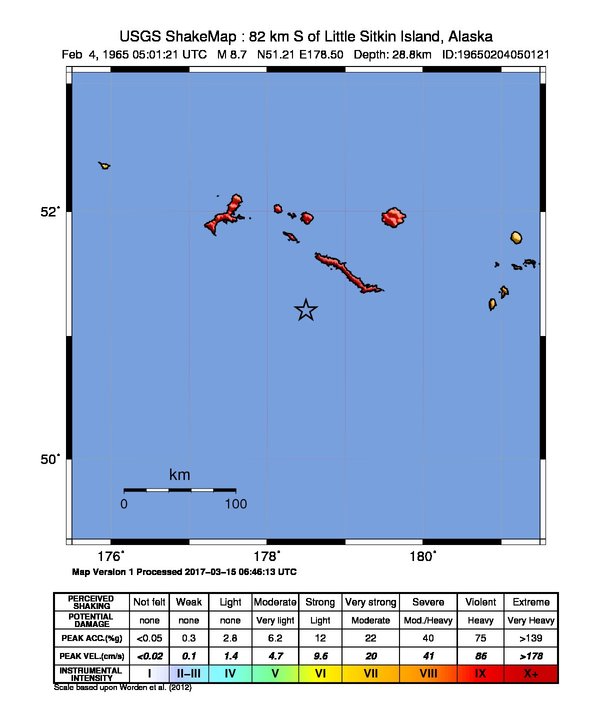
The Rat Islands earthquake was associated with a 600 km long rupture along the plate boundary, based on the distribution of aftershocks.
The pattern of energy release suggest the presence of three asperities along the plate interface, each causing a pulse of moment release. Modelling of the tsunami supports the idea that the earthquake consisted of three sub-events, related to three structural ‘blocks’ within the overriding plate.
The resulting tsunami had a maximum run-up height of 10.7m (35.1ft) on Shemya Island, 2.0m (6.6ft) at Amchitka Island, 1.6m (5.3ft) at Attu Island and 1.1m (3.6) in northern Kauai, Hawaii. It was also observed in Peru, Ecuador, Mexico, California, Japan and eastern Russia.
The main shock was followed by an earthquake of magnitude 7.6 nearly two months later, that triggered a small tsunami. This was not an aftershock, but a normal fault event within the outer rise of the subducting plate, triggered by the earlier event.
Flooding from the tsunami caused $10,000 worth of damage on Amchitka Island. Minor damage from the earthquake was recorded on both Attu and Shemya islands in the form of cracks in runways.
It seems we are closer to another volcanic eruption than to another major earthquake. But a sudden explosion may release enough power to trigger a powerful jolt. [AVO, Wiki]
Now subscribe to this blog to get more amazing news curated just for you right in your inbox on a daily basis (here an example of our new newsletter).
You can also follow us on Facebook and/ or Twitter. And, by the way you can also make a donation through Paypal. Thank you!
You should really subscribe to QFiles. You will get very interesting information about strange events around the world.



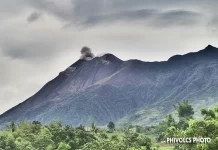
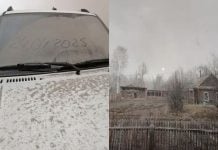









[Aside]
Speaking of Davidoff, if anybody likes pipe tobacco, Davidoff makes a tin, 50grams, red label, flake medallions. Taste is awesome. As you get down in the bowl, it gets even better too. Fricken oustanding.
Stockkbye makes a very nice flake medallion as well. Both are similar, and always out of stock, but they are very tasty.
10-meter-high tsunami
How about feet? And Tidal Wave?
There is no such word tsunami, when I researched it several years ago when it became into use. I did find information that stated a man in Asia don’t remember where seen a Tidal Wave coming in did not know what to call it and was shouting out the word tsunami.
The American news media picked it up and began to run with it.
Maybe they think it more dramatic than Tidal Wave.
You can check the original articles of the 1964 Quake in Alaska and it was a Tidal Wave period. I remember it.
I am tired of this type of reporting (let’s bring back the American way)
Thanks for putting up with my rant.
You are talking about the 1964 Great Alaska Earthquake, this article is about the 1965 Rat Islands earthquake! I added numbers in foot!